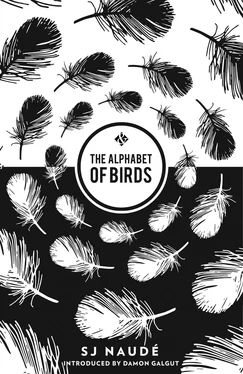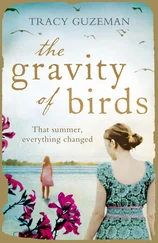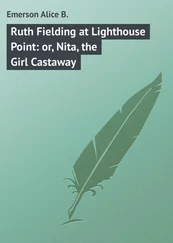‘I have news of your girls,’ she says. ‘The police have notified me. Both gone back to KwaZulu. Days ago already. To their families.’
‘To their families,’ Ondien repeats.
‘Yes, to their own people. Now they’ll be able to sing properly, I tell you!’
There is silence for a while.
‘Any message for me?’
‘No, but a package arrived for you from Lesotho. I’ve opened it. A Zulu outfit it is. Not all too clean, either. I’m having it dry-cleaned for you, ok?’
‘Hope I’ll be seeing you some time,’ Mrs Nyathi continues when Ondien does not answer. ‘It’s pretty lonely for a widow all on her own in the mountains, you know. And without any music too.’
For more than a year Ondien has neither sung, nor written, any music. She does not, in fact, ever listen to a single note. That is, if she can help it. In Johannesburg’s shopping malls, as in shopping malls everywhere, silence is hidden behind a curtain of muzak. And it is the shopping malls she is seeking out. She finds delight, now, in everything that is new and smooth. She has had enough of the old world’s gently weathered façades, of the artful curves of cobbled lanes. It is better here, the continental elements reimagined and embedded in fantastical monuments: shops transforming into courtyards and carparks, concrete additions accreting like flotsam. In here, in the bright light, it is possible to be emptied out, like in a monastery or a Buddhist retreat.
It is in one of these places, while she is having a cup of coffee, without a book or music, that she receives a call from her older brother, Cornelius, who lives in London.
‘Last I heard you had moved from London to Paris to make music,’ he says.
‘Where did you get my number, Cornelius?’
‘Zelda.’
Zelda is her younger sister who lives in Phoenix. They speak almost as infrequently as she and Cornelius.
‘Last month I was in South Africa for meetings. If I had known you were in Johannesburg, we could have met up.’
Before, when Ondien was a postgraduate student in London, she managed to see Cornelius once. A few times afterwards she tried to establish contact again, but his banker’s life was too busy, his travel schedule too full.
‘I wouldn’t have been able to meet. I’m not seeing anyone, I’m waiting.’
‘Waiting?’
‘For the music to return.’
‘Music? In Johannesburg?’ He snorts. ‘A suggestion,’ he says. ‘Come and visit me in London. For as long as you want. Perhaps here you’ll find your music again.’
As if, she thinks, Cornelius’s ear would comprehend anything other than the droning of things electrical in the shafts of office buildings.
‘Why now, suddenly, Cornelius? What about all the other things that are so demanding of your time?’
‘Something has changed,’ he says, ‘or everything.’
For a while she is silent. She looks at the people around her, Sandton’s pedestrian traffic. None of the delicate play of the European street here — no swift glances stretching erotic vectors back and forth like silk thread. People look at her bluntly, people who carry their bodies differently than in the North, lacking all concept of the relativity between their own and other flesh. They occupy space contemptuously, as if infinite distance were possible between bodies. A dour and spoilt lot, the people of Johannesburg. Defensive and full of bravado.
‘I can’t just pack up and leave in order to satisfy your whim, Cornelius. I’m settled here.’
She does not work. She lives on what remains of her inheritance in a garden flat that has been burgled four times in the past three months. Most of the small inheritance has been absorbed by living expenses in Paris or on loss-making tours in South Africa with her band, the Victorian Native Ladies’ Society, or VNLS. Until recently she was doing volunteer work in Johannesburg, in a rehabilitation centre for children with brain injuries, but was asked to leave. She now spends her days squatting in these muffled coffee shops, as if it were the Rive Gauche sixty years earlier. She is emptying herself of all that remains: this is how she thinks of her days in the shopping malls.
She does not have a single friend left in this country. The sum of her human interactions, since returning to Johannesburg, has been with Mrs Zuckermann (her landlady, a frail widow who has now been taken into a geriatric home), the director and children in the child rehabilitation centre and the editor of a fading local musicology journal. The latter entailed a few phone conversations about a proposed (now abandoned) article. She has seen a few old acquaintances: a former (now married) lover, a university friend who is a disillusioned academic at Wits university (‘It’s all so racialised now, one cannot function any longer.’ ‘What do you mean “now”?’ Ondien wanted to know.) She did not seek out their company again. Her old friends have either left the country, or she has lost touch with them. Perhaps, she considers, she has outgrown friendship. And family ties. Or perhaps such relationships — any relationships — in unpolluted form are impossible in this country. She does have a cat. Flame is his name. A lean blue Burmese.
‘I thought you said you were just waiting. For music, for some kind of intervention.’
She frowns. How many years since Cornelius left the country? Nine, ten? Apart from briefly at her father’s funeral, they have not spoken since their single meeting in London.
She can hear him breathe.
‘Do you know that Vera and Frank left for Dubai a few months ago?’ he asks. ‘Did you see them before they left?’
‘No and no.’
She had no desire to look up her sister Vera (older than her, younger than Cornelius) or her husband Frank, the über-important CEO, in their Italian villa in Bryanston.
‘What do you know about Zelda? Heard that she had to get another court order against that psychopath of an ex of hers?’
Ondien bumps lightly against the little table. Coffee spills. There are a few moments’ silence.
He continues. ‘I know it’s unexpected to hear from me, Ondien …’
‘Completely unexpected.’
‘Do you remember blood, how it’s supposed to be thicker than—?’
Her voice rises. ‘Cornelius, spare me the aphorisms. A weak spot in your armour would surprise me. But if you need support or something, just say so.’
His voice changes too. ‘I no longer sleep at night, Ondien. I’m standing here in an empty office, above a street full of black cabs. This entire building is made of glass, even the lifts. One is visible from every every goddamn angle …’
Zelda
When Ondien enters through the gates, Zelda is waiting in Phoenix Airport’s arrivals hall. She is holding the child’s hand and it is straining. Ondien addresses the child first, holds out the gift. ‘I brought you something, Stanley.’
The child looks at her from under his eyebrows. She waits for him to grab it or knock it from her hands, but he takes the parcel and slowly turns it round and round without opening it.
Zelda has lost weight. She addresses Ondien in English. Ondien responds in Afrikaans, partially to exclude the child. Zelda struggles with the car keys, half blind in the dim parking garage. They get into a white car. She begs Stanley to fasten his seat belt. She refuses to drive unless he obeys. The child sits with folded arms, shouting huskily and vehemently until his mother closes her eyes and leans back against the headrest. The voice echoes hard against concrete. It envelops Ondien like ice. Zelda relents. She closes her window and starts driving. The noise ceases.
‘It was Cornelius’s idea, the trip,’ says Ondien. ‘There’s a flavour of personal crisis in London. Of fragility, if you can believe that of our brother. But I can’t really figure out what’s going on.’
Читать дальше












